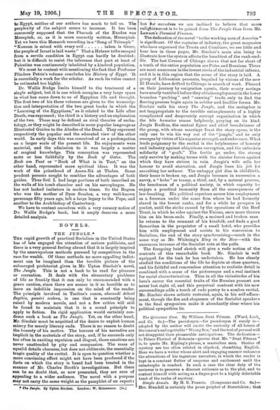NOVELS.
THE JUNGLE.*
THE rapid growth of practical Socialism in the United States has of late engaged the attention of serious publicists, and there is a very general feeling abroad that it is largely inspired by the unscrupulous methods pursued by competitors in the race for wealth. Of these methods no more appalling indict- ment can be imagined than the terrible picture of the submerged proletariat given in Mr. Upton Sinclair's novel, The Jungle. This is not a book to be read for pleasure or recreation. It deals with the elementary problems of life so frankly that it can only be recommended with a grave caution, since there are scenes in it so horrible as to leave an indelible impression on the mind of the reader. The principle involved in Tacitus's canon, abscondi debent tlagitia, puniri scelera, is one that is constantly being raised by modern novels, and not a few critics will still be found to maintain that it is a sound principle to apply to fiction. Its rigid application would certainly con- demn such a book as The Jungle. Yet, on the other hand, Mr. Sinclair must be acquitted of the desire to exploit human misery for merely literary ends. There is no reason to doubt the honesty of his motive. The horrors of his narrative are implicit in the materials of the story, and, if he succeeds only too often in exciting repulsion and disgust, those emotions are never unattended by pity and compassion. The mass of squalid details obscures, but does not obliterate, the essentially tragic quality of the recital. It is open to question whether a more convincing effect might not have been produced if the facts on which the story is based had been treated in the manner of Mr. Charles Booth's investigations. But there can be no doubt that, as now presented, they are sure of appealing to a wider audience. The novel with a purpose may not carry the same weight as the pamphlet of an expert ; The Jungie, By Upton Sinclair. London: W. Heinemann- Phi
but fee ourselves we are inclined to believe that more enlightenment is to be gained from The Jungle than from Mr. Lawson's Frenzied Finance.
The dedication of the novel " to the working men of America " is significant.. Of the captains of industry, the great magnates
who have organised the Trusts and Combines, we see little and hear less in these pages, Mr. Sinclair's main aim being to illustrate how the system affects the humblest of the rank-and- file. The last Census of Chicago shows that not far short of a tenth of the entire population are Poles and Russians. These are most numerous in the lowest circle of the industrial inferno, and it is in this region that the scene of the story is laid. A. group of Lithuanian peasants, beguiled by visions of the new El Dorado, have drifted to Chicago in search of work. Fleeced on their journey by emigration agents, their scanty savings have nearly vanished before they obtain employment in the lower branches "packing" and "canning" trade, only to find the fleecing process begin again in subtler and deadlier forms. Mr. Sinclair calls his story The Jungle, and the metaphor is not inappropriate to the terrible entanglements of a highly complicated and desperately corrupt organisation in which the bête humaine roams helplessly, preying on its kind. Jurgis Rudkus, the central figure and chief breadwinner of the group, with whose marriage feast the story opens, is the only one to win his way out of the "jungle," and he only emerges by virtue of his superior strength and endurance. What lends poignancy to the recital is the helplessness of honesty and industry against ubiquitous corruption, and the unbroken solidarity of "graft." The feeble go under, the strong only survive by making terms with the sinister forces against which they have striven in vain. Jurgis's wife sells her honour to avoid starvation, and Jurgis loses his job or assaulting her seducer. The unhappy girl dies in childbirth, their home is broken up, and Jurgis becomes in succession a navvy, a " hobo" or tramp, a thief, and, by a natural process, the henchman of a political society, in which capacity ho enjoys a practical immunity from all the consequences of law-breaking. His political superiors secure him employment as a foreman under the same firm where he had formerly slaved in the lowest ranks, and for a while he prospers in pocket, until the strike caused by the operations of the Beef Trust, in which he sides against the Unions, once more throws him on his beam-ends. Finally, a maimed and broken man he returns to the remnant of his kinsfolk, and finds a good Samaritan in the proprietor of a small hotel, who provides him with employment and assists in his conversion to Socialism, the end of the story synchronising—much in the same way as Mr. Whiteing's Ring in the New—with the enormous increase of the Socialist vote at the polls.
The foregoing brief sketch will give a rude notion of the contents of this remarkable book. Mr. Sinclair is well equipped for the task he has undertaken. He has clearly studied the conditions of the life he depicts at close quarters, and his faithful and remorseless attention to realistic detail is combined with a sense of the picturesque and a real instinct for racial characterisation. Thus in all the vicissitudes of his hero's career the essential traits of the Russian peasant are never lost sight of, and this perpetual contrast with his new surroundings adds a touch of rude poetry to a sombre recital. Mr. Sinclair shows artistic restraint, again, in his self-efface- ment, though the fire and eloquence of the Socialist speakers in the final symposium make it abundantly clear where his • political sympathies lie.










































 Previous page
Previous page